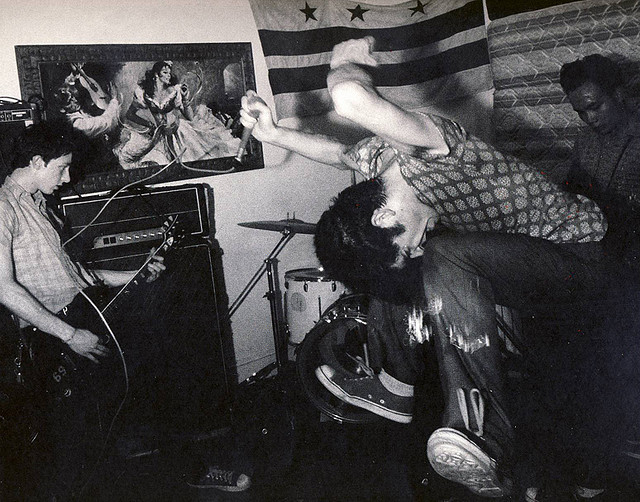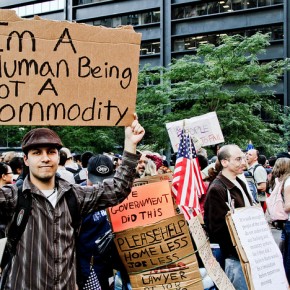Tom Waits’ new album, Bad As Me takes a swig and passes the bottle to the characters he’s hollered at and grumbled about for nearly forty years. We have: black sheep that families pay to never come home, the time-battered woman sitting at the bar after closing time, SRO hermits, and escapists who chase their fantasies on the highway until their rusted wheels fall off. The fumes of torn jeans stained by a thousand cigarette and diesel clouds mixed with rotted railroad planks all hit my nose when I heard the rockabilly jaunt of “Get Lost” and the gutbucket blues of the title track. It’s vintage Waits.
But there’s a tune that caught my ear and brought my mind to Oakland’s Frank Ogawa Plaza, as well as the police tear gas canisters, the protestors’ tents, and the vandalized windows of the city’s Whole Foods supermarket. “Well, we bailed out all the millionaires/They got the fruit/We got the rind/And everybody’s talking at the same time,” he whimpers in an exhausted falsetto on “Talking at the Same Time.”
Waits is now out of the golden postwar period he shrouded in myth for so long. He’s there with us. Waits is overwhelmed by the dissonance of conflicting opinions about government powers trying to save the “job creators” or the wealthy elite while leaving little for the rest – who are told that having a weak character, which made poor financial decisions earned them their misfortune. “Well, it’s hard times for some/For some, it’s sweet/Someone makes money when there’s blood in the street,” he sings. Backing up Waits’ angst is a weathered calypso groove anchored by a tiptoeing bass line, horns whispering behind his back, and guitar riffs that blow dust across the bow. It’s an atmosphere tainted by the ghosts of roadhouses past, a place where Waits’ old soul usually ends up. “Well, the dog is in the kitchen and the war drags on/The trees wait by the freeway/All the money is gone,” the defeated man laments.
Now “Talking” could be easily deemed as yet another “retro” excursion by Waits who told journalists about his childhood hobby of wearing his grandfather’s clothes and acting like an old man. Yet, there’s a time warp at play. Waits connects our age to the dreary times of the Great Depression, and the first decade of the Cold War – if he subtracted the verse about the bailed-out millionaires and if he roughed up the sound quality a bit, the instrumentation of “Talking” could be mistaken for being sixty years old. However, the lyrics are nakedly contemporary.
One song that often comes to my mind while listening to “Talking” is “Depression III” by the late 1980s/early 1990s Washington, D.C. punk band Nation of Ulysses. That blues song as well as the cool-jazz excursion, “N.O.U. Future-Vision Hypothesis” seem like aberrations amid the poison-tipped salvos of thrash-punk aimed at America’s “parent culture” on the 1992 album, Plays Pretty for Baby. Producer Ian MacKaye took the band’s sound away from the ear-stabbing assaults and brought them to a realm that could be mistaken for an old blues 78. The title of Depression III implies that it’s a tune for America’s future economic depression, while ostensibly absorbed in the music of the second American depression that swallowed so many lives in the 1930s. The song has a ghostly presence: a lush jazz-guitar melody floats out of the decayed, low-fi haze that smothers the percussion and a muttering saxophone. “It’s just like the clouds over my head…I don’t seem to understand this/I don’t think you understand, I don’t seem to get from underneath it,” Ian Svenonius sings in a tortured bluesman’s drawl. The band’s marching jazz cadence nearly falls out of joint when he sings, “I try, I try, I try.” Svenonius doesn’t see a way out from the depression within and without. “It wants to go where I go, it wants to do what it pleases, it won’t leave me alone, it won’t go away,” he whimpers.
The Nation of Ulysses took an anti-retro stance in their thick communiqués that are uneasily marinated in either earnest, radical chic calls to arms or an ironic parody of such rhetoric. These are the same guerillas that notoriously declared themselves to be permanently eighteen. “The Nation of Ulysses are a new thing altogether,” the band declares in Pretty’s liner notes. “(T)heir anti-nostalgia imperative roused by their denial of legitimizing and strangulating language; The N.O.U. stands alone in the waste today, seducing the wide-eyed with their petulant promise, “We’ll smash the world apart, stick it back together, and name it new tonight.” Of course, Pretty’s album cover resembles a vintage garage-band concert shot while the inner sleeve has images grafted from what resembles an 1940s-era Sears-Roebuck catalog. Yet, the title of “Depression III” and its music employs retro elements in a uniquely futuristic sense where America’s future depression will likely bear echoes of the previous one. It all makes sense in our time when the Future, the ecological and economic Future, is to be dreaded.
While Waits and Svenonius continue the tradition of defeated souls, Brooklyn heavy-funk revivalists Sharon Jones and the Dapkings crack open a warrior’s tomb and pick up the sword in their 2006 single, What If We Stopped Paying Taxes? Embers from bonfires ignited by Nina Simone and Betty Davis 40 years ago are stoked by Jones as she recalls a conversation with a friend who didn’t want anymore wars. “They’re building bombs while our schools are failing/Tell me what in the hell we’re paying taxes for?” Jones sings at a rally-the-troops tone. Handclaps from audience members are soaked in vintage, 1960’s style spring reverb while the Dapkings unleashes a Stax funk groove to awaken the dead. The tune is a highlight on the 2006 anti-Iraq war compilation, Impeach the Precedent.
“Now tell me who is going to buy their bombs, their tanks, their planes, and all their guns?” Jones demands the listener to answer. “Tell me who is going to pay for their wars if we all get together and cut their funds?” Such lyrics could’ve been sung during the Vietnam Conflict, and every American war since then. “How can we talk about the price of gas when they’re stealing our brothers and sisters’ rights to live?” An announcer later intervenes, as if speaking like a teacher on the 1970’s children show, The Electric Company. “Children of America…Let Mr. Politician know how you feel, let him know you’re not going to take no more…stop paying for corruption and injustice.” There’s a time warp afoot between the 1960s and the mid-00s antiwar movements in the song, given the nearly timeless message. The Dapkings happened to support pop star/1960’s revivalist Amy Winehouse on tour at the time that “”What If” was released – in the past decade’s pop culture, such instrumentation was more contemporary than merely retro.
It’s all too easy to declare the protest song to be dead these days when file-sharing and iTunes consumer choice eroded the power of Western pop artists to influence the masses. There’s the danger of topical songs becoming artifacts that grow more and more irrelevant to future generations. A pessimism taints Guardian music writer Dorian Lynskey’s recent history book on protest music, 33 Revolutions Per Minute. He realized that he wrote a “eulogy” for such music after documenting the failures of so many famous songs that were meant to incite radical change. “It is not just that people have lost faith in any performer to help bring about change, it is that they resent anyone who attempts to do so….Who would be compelled to write, in George Melly’s words, “Songs for the barricade” when there are no barricades?” Lynskey laments. “There comes a point where we have to accept that a musician does not have the same responsibilities as a politician.”
I believe that protest music still has a vital role in stimulating the political imagination and painting a tint in the atmosphere of the streets and halls of power. Seemingly “retro” protest songs can seep into the mind quite well since they draw power from past forms of musical resistance that caught so many hearts and minds. Audiences could appreciate the old-fashioned soul and cries for mercy in Waits’ “Talking” and the Nation of Ulysses’ “Depression III,” but there are key lyrics and atmospheres that could likewise haunt the listeners’ imaginations during dire times. Sharon Jones’ call for a taxpayers’ revolt against government corruption and endless war is still a radical statement, no matter the seemingly “retro” elements at play. Such songs remind us that the same anguish and rage felt by many souls for several generations hasn’t aged at all – it’s waiting there to be inherited by us who live in “a socialist-fascist state,” or “a capitalist slave society,” or “a society of parasitic entitlement,” or “a post-American century.” Everybody’s talking at the same time.
Nation of Ulysses photograph courtesy of Brooks Golden. Published under a Creative Commons license.





